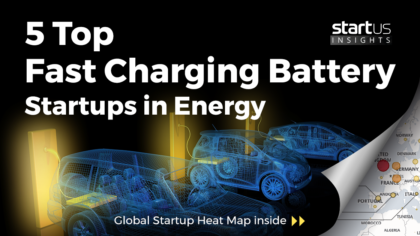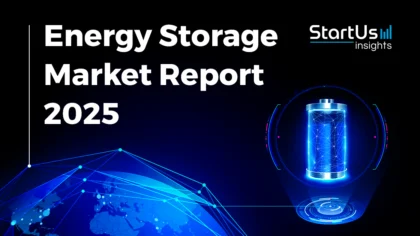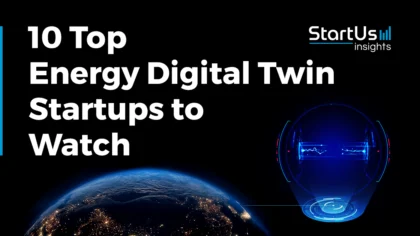Our Innovation Analysts recently looked into emerging technologies and up-and-coming startups working on solutions for the energy sector. As there is a large number of startups working on a wide variety of solutions, we want to share our insights with you. This time, we are taking a look at 5 promising fast charging battery startups.
Heat Map: 5 Top Fast Charging Battery Startups
For our 5 top picks, we used a data-driven startup scouting approach to identify the most relevant solutions globally. The Global Startup Heat Map below highlights 5 interesting examples out of 175 relevant solutions. Depending on your specific needs, your top picks might look entirely different.
Addionics – 3D Nanostructure Cathodes
The ever-increasing use of consumer electronics, wider adoption of electric vehicles (EVs), and advancements in renewable energy are pushing the need for energy storage. A three-dimensional (3D) nanostructure for battery cathodes allows for faster charging and discharging without any loss in energy storage capacity. In addition to the fast charging capabilities, it improves the cycle life of the current lithium-ion batteries. Batteries with 3D nanostructure cathodes combine capacitor-like power with battery-like energy to achieve large capacity and large current.
Addionics is a UK-based startup that provides high power, high capacity rechargeable batteries with low resistance 3D metal collectors. Their patent-pending 3D metal fabrication method enhances performance, mileage, safety, cost, and charging time of batteries. It reduces charging time by half and increases the range at high speed for electric vehicles.
StoreDot – Organic Compounds
Next-generation batteries feature higher energy densities, better capacities, and the use of cheaper, safer, and environment-friendly materials. New battery types use the same rocking-chair, charging-discharging technology as the lithium battery, where lithium-ions are substituted with other metal ions such as sodium, magnesium, or aluminum. Organic compounds do not contain harmful and expensive heavy metals. However, they dissolve in liquid electrolytes, making organic electrodes inherently unstable.
The US-based startup StoreDot develops fast charging batteries for both mobile devices and EVs. Their technology integrates nanotechnology with proprietary organic synthesis to manufacture flash batteries with low internal resistance (ESR) and high energy density. Their solutions fully charge a mobile phone or an electric car in 5 minutes.
GBatteries – Adaptive Pulse Charging
Two common limitations of fast charging technologies are rapid battery degradation and reduced life-time cycle. Adaptive pulse charging and discharging method for lithium-ion and lithium-polymer batteries determines overcharged, undercharged, normal, and degraded operating conditions. It adjusts a fraction of recharge capacity to discharge capacity to improve battery life while maintaining the battery cells at a high charge state. The technology eliminates the barrier of long charging time and accelerates the adoption of electric vehicles.
GBatteries is a Canadian startup that develops an Artificial Intelligence (AI)-based technology to rapidly charge lithium-ion batteries without any compromise in cycle life. Their adaptive pulse charging algorithm operates in lower impedance periods. As a result, the batteries do not heat up during ultra-fast charging. They use off-the-shelf hardware and proprietary architecture to generate precisely engineered pulses at high frequencies.
Geyser Batteries – Aqueous Electrochemistry
The present-day high-energy lithium-ion batteries use graphite anodes and transition metal oxide cathodes in liquid electrolytes. Fast charging these batteries diminishes their electrochemical performance and safety. However, aqueous electrochemistry based alternatives exhibit electrical double-layer capacitive characteristics and facilitate fast charging.
The Finnish startup Geyser Batteries offers high-power, heavy-duty energy storage solutions based on proprietary aqueous electrochemistry. They deliver sustainable power over deep-discharge cycles at ultra-high power in extreme ambient conditions. Their products use widely available chemical materials and water as a solvent to combine the energy storage of batteries with the durability and power of supercapacitors in a single electrochemical system.
InvertedPower – Direct Current Fast Charging
Direct current (DC) fast charging converts alternating current (AC) to direct current to significantly reduce charging times. The technology bypasses the onboard charger of EVs and sends this direct current directly to the battery. Therefore, charging is not limited by the performance of the onboard charger and is much faster.
InvertedPower, a startup based in Australia, builds and licenses multimodal power conversion technologies for EV charging stations. Their integrated charger is a low-cost solution to direct current fast charging. It reuses the high-powered electronics of the traction drive to perform an ultra-fast flash charge when the vehicle is connected to power. Moreover, it significantly reduces the cost of setting up EV charging infrastructure.
What About The Other 170 Solutions?
While we believe data is key to creating insights it can be easy to be overwhelmed by it. Our ambition is to create a comprehensive overview and provide actionable innovation intelligence for your Proof of Concept (PoC), partnership, or investment targets. The 5 fast charging battery startups showcased above are promising examples out of 175 we analyzed for this article. To identify the most relevant solutions based on your specific criteria and collaboration strategy, get in touch.









